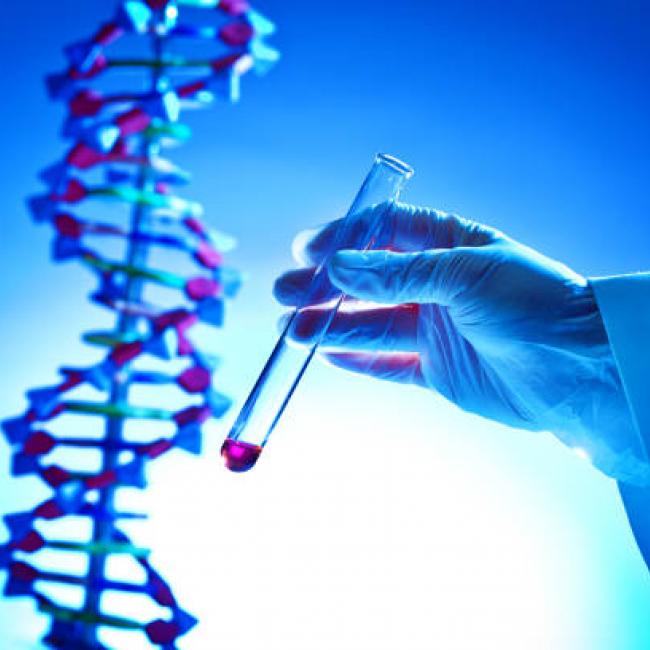
Endometrial cancer is being diagnosed at younger and younger ages for many reasons.
One major reason is a genetic condition called Lynch Syndrome. This is an inherited condition that increases the risks of colon cancer, endometrial cancer, and bladder cancers in families. Black women are at the same level of risk of any other US woman for this condition. The terms ‘genetics’ and ‘cancer’ can be scary - but only when we don’t empower ourselves to take control of our lives.
Our ECANA friend, Marissa Thomas, has done just that.
Please read on to hear about her journey from fear to empowerment as a Black woman affected by Lynch Syndrome.
Marissa's Story:
Growing up, most of us were thought to believe that Cancer is an “old persons” disease. After being diagnosed at the young age of 35 with Breast Cancer, I know now that is not true at all. Now with the advancement in medical technology and research, we can begin to tackle this awful disease head-on and even before it happens. This comes with not only preventative medicine but the little talked about, unknown world of Genetics. Genetics, doctors and researchers are realizing, plays an important part in why some of us are “predisposed” to certain diseases, including Cancer.
Take myself for example, about 10 years ago my dad told myself and my siblings that we should go see a Genetic Counselor and have genetic testing done because he tested positive for Lynch Syndrome. My dad grew up in a family with 15 brothers and sisters whom most of them, including my dad have either had Cancer or passed away from Cancer. When he was in his early 40’s part of his colon was removed due to a tumor as well as multiple polyps being found every year afterwards. His Oncologist knew this wasn’t just a coincidence; something had to be the reason why. The Oncologist urged my dad to have Genetic testing to see if the reason for these multiple polyps might be Lynch Syndrome. Once Lynch Syndrome was declared the actual cause, this helped paint a clearer picture for him and his medical team. They know not only what to look for, but also, what tests need to be completed so we can hopefully get in front of this before it is too late.
But there is a flip side to this and I can attest to that feeling; knowing you have a gene that predisposes you to cancer and that one day you might get cancer and possibly die. And I understand why some folks do not want to have genetic testing. It is easier to walk within the unknown rather than face a fear. It’s like staring down the barrel of a gun waiting for someone to come and pull the trigger. However, think about the control and power you have with this information. You can direct your healthcare (which you all should be doing by the way) as well as make sure your medical providers stay up to date in how you should be treated. When I was first told I had Lynch Syndrome I was upset and angry. Instead of stewing in those emotions, I empowered my medical team to make sure I had all of the correct testing done every year so if anything arises; it is caught, hopefully early. They also make a point to research each year what advancements have been made and if any additional testing should be done when I see them.
Lynch Syndrome predisposes both women and men primarily to colon cancer and it is most prevalent in minorities. Because of this, I have a colonoscopy every year and while most might balk at this, let me just say the drugs are good. Probably the best sleep I get all year! Lynch Syndrome also predisposes women to Ovarian and Endometrial Cancer. Each year at my annual I have extra testing completed as well as an ultrasound. To some, this can be time consuming and not comfortable, but I would rather be safe than sorry. When I was diagnosed with Breast Cancer, I told all of my doctors I firmly believe Lynch was the cause of my cancer. Most dismissed my assumption and said there was no way possible. Three years later, researchers are now discovering this might be true; Lynch Syndrome may cause Breast Cancer as well. My hope is that more research is done to see if there is a link between Breast Cancer and Lynch Syndrome. This way young woman like myself, will not have to go through what I did or at the very least be able to have mammograms at a young age that is covered by their insurance.
The thing about this gene is it is fairly new when it comes to known gene mutations. Many do not understand it and most have never heard about it. But those of us who have this gene mutation can not only get the word out but demand more research is done so we can save lives. Genetic testing can be expensive and some insurance companies may not cover this but there are ways to work around this. If you do have a gene mutation, particularly Lynch Syndrome and there are research studies in your area, Sign Up!! Researchers cannot figure out how to combat this without our help. For example, I was on a research study for Ovarian Cancer because I have this gene. No, I did not have Ovarian Cancer but because I was predisposed to it, I was able to be on this study. Not only did I help the researchers but I helped myself. Every few months I would get my blood drawn and have a pelvic ultrasound, where they would monitor me, At No Cost!! What I want you to takeaway is this: If you have any cancer in your family, get genetic testing, it could possibly save your life!
Lynch Syndrome Overview
Endometrial cancer is the fourth most common cancer in US women. While the vast majority of endometrial cancer is sporadic and the result of many different risk factors, approximately 5-10% is due to inherited or genetic changes. Most inherited endometrial cancer is due to Lynch syndrome. In addition to endometrial cancer, individuals with Lynch syndrome are at an increased risk for colon, ovarian, gastric and other cancers.
Lynch syndrome is due to alterations in genes that have a role in repairing errors that can occur when DNA is copied prior to cell division; MLH1, MSH2, MSH6, PMS2, and EPCAM. These genes encode for proteins that play an important role in protecting us against cancer. Lynch syndrome is inherited in an autosomal dominant manner, meaning that there is a 50% chance of inheriting the mutation and associated cancer risks from an affected parent. It is important to note that although affected individuals are at an increased risk of cancer as compared to the general population, some may never develop cancer. Additionally, even when multiple members of a family have Lynch syndrome, they may not all be affected in the same way.
The benefits of a genetic diagnosis for an affected individual includes proactive management and surveillance for Lynch syndrome associated cancers. This may include surveillance colonoscopies given an increased risk for colon cancer, or a discussion about risk-reducing surgery given the risk for ovarian cancer. A diagnosis allows affected individuals to make informed medical decisions that reduce risk. Additionally, the identification of a disease-causing alteration in one of these genes, can help guide the testing and diagnosis of at-risk relatives.
 Clinical information provided by:
Clinical information provided by:
Kenneth Ndugga-Kabuye, MD
Senior Fellow, Medical Genetics and Genomics
University of Washington
Dept of Medicine, Division of Medical Genetics
Sources:
National Library of Medicine (US). Genetics Home Reference [Internet]. Bethesda (MD): The Library; 2019 Apr 16. Lynch syndrome; [reviewed 2013 May; cited 2019 Apr 16]. Available from: https://ghr.nlm.nih.gov/condition/lynch-syndrome
Kohlmann W, Gruber SB. Lynch Syndrome. 2004 Feb 5 [Updated 2018 Apr 12]. In: Adam MP, Ardinger HH, Pagon RA, et al., editors. GeneReviews® [Internet]. Seattle (WA): University of Washington, Seattle; 1993-2019. Available from: https://www.ncbi.nlm.nih.gov/books/NBK1211/
National Comprehensive Cancer Network. Genetic/Familial High-Risk Assessment: Colorectal (Version 1.2018). https://www.nccn.org/professionals/physician_gls/pdf/genetics_colon.pdf. Accessed April 16, 2019.
If you or a loved one has been diagnosed with endometrial cancer, the tumor should be tested for “mismatch repair protein loss.” This is a screen to see if Lynch syndrome may be the cause. In addition, all young women (under age 50) diagnosed with EC should be screened. Finally, if you have several family members diagnosed with colon and/or bladder cancer - this may also be a sign of Lynch Syndrome.
We encourage you to reach out to your primary care doctor for more information about genetic testing.





